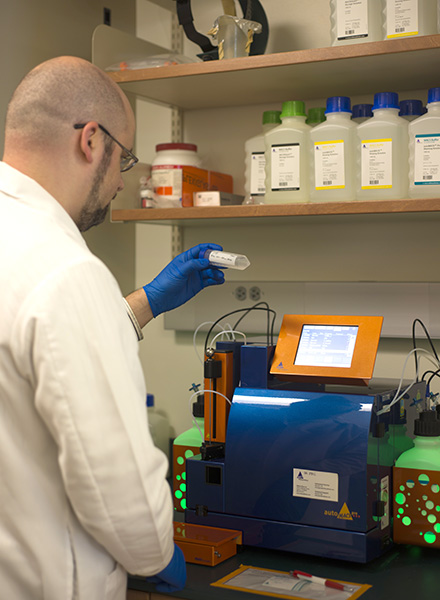Career development awards from the UW School of Medicine and Public Health (SMPH) and the National Institutes of Health are helping Christian Capitini, MD, in his quest for a new immunotherapy treatment for leukemia.
Reprogramming Donor Bone Marrow

Dr. Capitini’s work builds on traditional bone marrow transplant immunotherapy, in which scientists isolate immune cells (T cells) from a healthy donor and then inject those cells into a recipient with cancer.
Immunotherapy is always a balancing act: the newly infused T cells may kill the cancer, but they also can attack the recipient, causing a potentially life-threatening complication known as graft versus host disease (GVHD). Current drugs inhibit T cells, treating GVHD but also hindering their anti-cancer function.
Dr. Capitini’s research, however, focuses on the cells that prime donor T cells, not the T cells themselves. Using a mouse model, his team identified a molecule called STAT1 that, when removed from donor bone marrow, alters the development of donor dendritic cells—which in turn inhibits the cellular cascade that feeds T-cell activation, preventing GVHD.
When they injected the “reprogrammed” donor marrow into a recipient, they found that it suppressed the immune response enough to reduce the likelihood of GVHD, but preserved the ability to fight the cancer. Their findings were published in Blood in September 2014.
Career Development Support
Dr. Capitini joined the Department of Pediatrics in 2011, after serving as a clinical fellow and instructor at the National Cancer Institute (NCI) and completing a pediatric hematology/oncology fellowship through a joint program with the NCI and Johns Hopkins University.
In 2012, he received an SMPH Centennial Scholarship, which provided him with 75 percent protected research time for three years.
He considers that award “very critical” to his career. It enabled him to establish a laboratory and demonstrate institutional support—two prerequisites for a National Institutes of Health Career Development Award (K08), which he received in June 2014.
In April 2015, Dr. Capitini also received a UW-Madison Vilas Faculty Early Career Investigator Award, which provides additional flexible funds for his research.
‘Bench-to Bedside’ Research Potential
Today, Dr. Capitini is excited about how his research can potentially translate into future clinical trials.
He sees a possible opportunity in the drug ruxolitinib (Jakafi), which the Food and Drug Administration approved in 2011 for the treatment of myelofibrosis, a rare type of bone marrow disorder. Ruxolitinib inhibits JAK1 and JAK2, two enzymes that “turn on” the STAT1 molecule.
Dr. Capitini said that three laboratories worldwide have shown in mouse models that giving ruxolitinib reduces the risk of GVHD. He hopes to someday investigate whether incubating donor dendritic cells with ruxolitinib before infusing them into a recipient could prevent GVHD while treating their leukemia.
“We have the infrastructure for this type of translational research on the UW-Madison campus,” he said, citing Waisman Biomanufacturing as an example. “Doing this research initially at a cutting-edge laboratory facility like the Wisconsin Institutes for Medical Research with the potential to convert those laboratory ideas to clinical-grade cell therapies at Waisman is one of the main reasons I came here.”
“It makes the concept of ‘bench-to-bedside’ research plausible for physician-scientists like me, and puts us at the forefront of delivering the latest discoveries for patients treated here.”